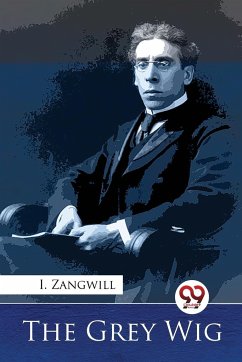
The Grey Wig - Stories and Novelettes
With a Chapter From English Humorists of To-day by J. A. Hammerton

PAYBACK Punkte
14 °P sammeln!
"The Grey Wig" is a 1923 collection of short stories by British author Israel Zangwill (1864-1926). They include: "The Grey Wig", "Chassé-Croisé", "The Woman Beater", "The Eternal Feminine", "The Silent Sisters", "The Big Bow Mystery", "Merely Mary Ann", "The Serio-Comic Governess", etc. Israel Zangwill was a leading figure in cultural Zionism during the 19th century, as well as close friend of father of modern political Zionism, Theodor Herzl. In later life, he renounced the seeking of a Jewish homeland in Palestine. A notable portion of Zangwill's work concentrated on ghetto life and earne...
"The Grey Wig" is a 1923 collection of short stories by British author Israel Zangwill (1864-1926). They include: "The Grey Wig", "Chassé-Croisé", "The Woman Beater", "The Eternal Feminine", "The Silent Sisters", "The Big Bow Mystery", "Merely Mary Ann", "The Serio-Comic Governess", etc. Israel Zangwill was a leading figure in cultural Zionism during the 19th century, as well as close friend of father of modern political Zionism, Theodor Herzl. In later life, he renounced the seeking of a Jewish homeland in Palestine. A notable portion of Zangwill's work concentrated on ghetto life and earned him the nickname "the Dickens of the Ghetto". Other notable works by this author include: "Dreamers of the Ghetto" (1898), "Grandchildren of the Ghetto" (1892 ), and "Children of the Ghetto: A Study of a Peculiar People" (1892). This classic work is being republished now in a new edition complete with an introductory chapter from "English Humourists of To-Day" by J. A. Hammerton.














